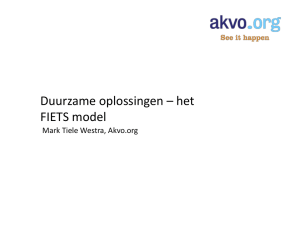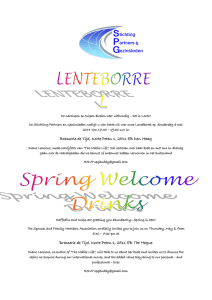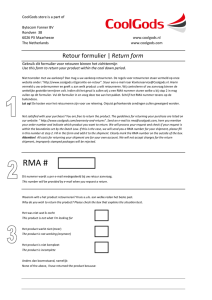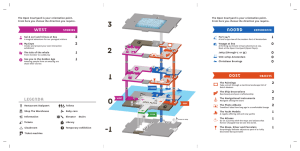Programme folder
advertisement
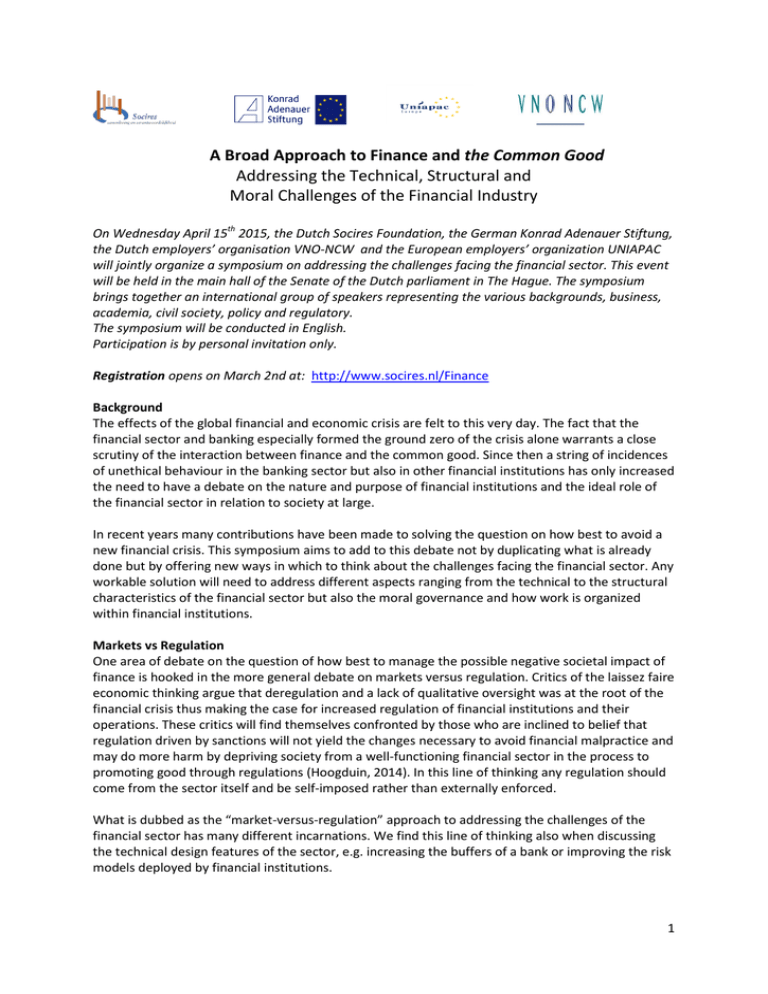
A Broad Approach to Finance and the Common Good Addressing the Technical, Structural and Moral Challenges of the Financial Industry On Wednesday April 15th 2015, the Dutch Socires Foundation, the German Konrad Adenauer Stiftung, the Dutch employers’ organisation VNO-NCW and the European employers’ organization UNIAPAC will jointly organize a symposium on addressing the challenges facing the financial sector. This event will be held in the main hall of the Senate of the Dutch parliament in The Hague. The symposium brings together an international group of speakers representing the various backgrounds, business, academia, civil society, policy and regulatory. The symposium will be conducted in English. Participation is by personal invitation only. Registration opens on March 2nd at: http://www.socires.nl/Finance Background The effects of the global financial and economic crisis are felt to this very day. The fact that the financial sector and banking especially formed the ground zero of the crisis alone warrants a close scrutiny of the interaction between finance and the common good. Since then a string of incidences of unethical behaviour in the banking sector but also in other financial institutions has only increased the need to have a debate on the nature and purpose of financial institutions and the ideal role of the financial sector in relation to society at large. In recent years many contributions have been made to solving the question on how best to avoid a new financial crisis. This symposium aims to add to this debate not by duplicating what is already done but by offering new ways in which to think about the challenges facing the financial sector. Any workable solution will need to address different aspects ranging from the technical to the structural characteristics of the financial sector but also the moral governance and how work is organized within financial institutions. Markets vs Regulation One area of debate on the question of how best to manage the possible negative societal impact of finance is hooked in the more general debate on markets versus regulation. Critics of the laissez faire economic thinking argue that deregulation and a lack of qualitative oversight was at the root of the financial crisis thus making the case for increased regulation of financial institutions and their operations. These critics will find themselves confronted by those who are inclined to belief that regulation driven by sanctions will not yield the changes necessary to avoid financial malpractice and may do more harm by depriving society from a well-functioning financial sector in the process to promoting good through regulations (Hoogduin, 2014). In this line of thinking any regulation should come from the sector itself and be self-imposed rather than externally enforced. What is dubbed as the “market-versus-regulation” approach to addressing the challenges of the financial sector has many different incarnations. We find this line of thinking also when discussing the technical design features of the sector, e.g. increasing the buffers of a bank or improving the risk models deployed by financial institutions. 1 The Cultural and Moral Dimension Sir Richard Lambert of the Banking Standards Review Council noted in his address to ResPublica that there are limits to what can be achieved by regulation and law. This brings us to another widely shared approach on identifying the woes of the financial industry, namely the behavioural and cultural dimension. Much has been written about the idea that a culture of greed and broader neglect has gripped the financial sector and thereby has added to the destructive impact that the dealings ultimately had on society at large. The problem with this aspect in the equation is that cultural change or moral awareness within organisations cannot be decreed or produced but involves a process that takes time and is hard to manage. The Dutch Banking Association (NVB) gave concrete substance to the idea of the need for a cultural and moral reaffirmation for the financial industry by introducing and advancing the Banker’s Oath. Initially this Oath was introduced for all members of the executive and non-executive board on financial companies. As of the beginning of April 2015 the broadening of the population of bank employees that takes the Oath will commence and in one year from now the taking of the oath will become mandatory for all banking employees. This Oath will not only have legal implications as it becomes disciplinary court thereby tying in with the advancement of self-regulation. The current Governor of the Bank of England, Mark Carney subscribed to the view that the "(...) the succession of scandals means it is simply untenable now to argue that the problem is one of a few bad apples. The issue is with the barrels in which they are stored" (2014). This observation hints that the discussion on the cultural and moral dimension of the financial industry is advanced by also looking at the institutional and organisational settings moving beyond approaches that are very much tied to the individual. This need to look at the organizational level is reinvigorated by the fact that regulation apart from the initial underlying intentions also has a tendency to introduce complexity into the system – and complexity in turn can and indeed will influence market behaviour. In this line of reasoning it’s very apt to speak of legislation and indeed regulatory as an ethical force. The Structure of the Financial Industry Lastly there is another aspect that has been hotly debated in recent times in relation to the financial industry relates to make-up of the sector itself. Some commentators feel that to have diversity in the nature of financial institutions is an end to be prized in itself. This encompasses the idea that the sector is helped by having different types of banks ranging from large to small, from consumer banks to investment banks, and with diverse ownership structures. It’s easy to see that this view has considerable implications for the regulatory framework and legislative agenda. In any case it consists of a rethink of the universal bank and the economies of scale that are desirable in the financial sector. The overall aim of the symposium is to bring together the current state of thinking from different domains and possibly shine a new light (by way of combining ideas from different areas) on how to ensure that the financial sector is aligned with the common good. Active participation from the audience is key ingredient for the success of this symposium. The organizers therefore hope you will be able to join them in The Hague on the 15th of April. 2 ORGANISED BY: The Socires Foundation is a Dutch expertise centre that was founded in 2000 to stimulate reflection and research on culture and society. In Socires' vision personal commitment, organizational performance and social vitality are intrinsically connected with each other. Central to the vision of Socires is the idea of humanizing: we need each other for developing our talents, for experiencing meaning, to become human. Communities and organizations thrive when they are governed and organized according to this principle. The Konrad Adenauer Stiftung was established in 1955 as “Society for Christian-Democratic Civic Education”. It is a political foundation that offers a wide variety of civic education conferences and events in Germany, and through its offices abroad is active in more than 120 countries. Its focus is on consolidating democracy, the unification of Europe and the strengthening of transatlantic relations, as well as on development cooperation. UNIAPAC is a federation of associations, an international meeting place for Christian Business Leaders. Its full name is the “International Christian Union of Business Executives”. Originally created in 1931 in Europe, it is an international non-profit association headquartered in Paris. UNIAPAC represents 16.000 very active business executives around the world, working in various leading sectors of the world economy. The Confederation of Netherlands Industry and Employers (known as VNO-NCW) is the largest employers’ organization in the Netherlands. VNO-NCW represents the common interests of Dutch business, both at home and abroad and provides a variety of services for its members. Over 160 branch associations are members, representing more than 115,000 enterprises. They cover almost all sectors of the economy, including more than 80% of all medium-sized companies in the Netherlands and nearly all of the larger, corporate institutions. 3 Program 12:00 – 13:00 Registration / Lunch buffet 13:00 – 13:05 Welcome Drs. Gerrit Terpstra, Member Dutch Senate 13.05 – 13.10 Welcome Mr. Jos van Gennip, President Socires Moderator: Dr. Stefan Gehrold, Director European Office Konrad Adenauer Stiftung 13:10 – 13:40 Keynote Speech Mr. Steven Vanackere, Senator, former Vice Prime Minister and Minister of Finance Belgium 13.40 – 13.50 Q&A 13.50 – 14:30 Panel I – Challenges to the Banking industry Dr. Onno Ruding, former Minister of Finance The Netherlands Dr. Ansgar Tietmeyer, Head Public Affairs Deutsche Bank (tbc) Drs. Chris Buijink, President Dutch Banking Association 14.30 – 15.10 Coffee Break 15:10 – 15.50 Panel II – Moral Governance and Organisational Complexity Dr. Maarten Biermans, Program Coordinator Socires Dr. Roland Kupers, Roland Kupers Consult 15.50 – 16:30 Panel III – Regulation and the Financial Landscape Stephan Werhahn Ph.D. M.Sc, Vice-president UNIAPAC Europe Drs. Marnix van Rij, Senior Partner Ernst&Young 16.30 – 17:15 Panel Discussion 17.15 – 17.30 Closure Mr. Jos van Gennip, President Socires 17:30 – 18:30 Drinks 4 Eerste Kamer der Staten-Generaal Openbaar vervoer vanaf Den Haag C.S http://www.eerstekamer.nl/home Binnenhof 22 2513 AA Den Haag 070 - 3129200 Vanaf Centraal station: tram 17 of 16 bus 24 of 22 Uitstappen: halte Spui en Hofweg Looproute vanaf Den Haag C.S. vanaf Centraal Station: 10/15 minuten: Centraal Station, uitgang Malieveld Stationplein schuin naar links oversteken Bij de stoplichten oversteken en rechtdoor naar de Herengracht Aan het einde van de Herengracht weg oversteken en rechtdoor naar Korte Poten Het plein naar rechts schuin oversteken tot het Mauritshuis Het Mauritshuis aan uw rechterhand houden Bij het Binnenhof onder de twee poorten door De Hoofdingang van de Eerste Kamer bevindt zich na circa 50 meter aan uw rechterhand onder de zuilengalerij (nr. 22) De ingang van de publieke tribune is bij nr. 23 ( in de hoek, aan het einde van de zuilengalerij). A4 vanuit Amsterdam Neem de A4 richting Den Haag Centrum Na Prins Clausplein op de Utrechtse Baan rechtdoor tot aan de stoplichten Hier linksaf de Zuid-Hollandlaan in Bij volgende stoplichten linksaf de Koningskade in (bijtijds voorsorteren) Vervolgens eerste weg rechts: Korte Voorhout in Tweede straat linksaf de Lange Houtstraat in Volg de weg, na 200 meter (inrit Parkeergarage), rechtsaf, het Plein op Rechtdoor is het Binnenhof. A12 vanuit Utrecht Neem de A12 richting Den Haag Centrum Na Prins Clausplein op de Utrechtse Baan rechtdoor tot aan de stoplichten Hier linksaf de Zuid-Hollandlaan in Bij volgende stoplichten linksaf de Koningskade in (bijtijds voorsorteren) Vervolgens eerste weg rechts: Korte Voorhout in Tweede straat linksaf de Lange Houtstraat in Volg de weg, na 200 meter (inrit Parkeergarage), rechtsaf, het Plein op Rechtdoor is het Binnenhof. A13 vanuit Rotterdam Neem de A13 richting Den Haag Centrum/Voorburg Na Prins Clausplein op de Utrechtse Baan rechtdoor tot aan de stoplichten Hier linksaf de Zuid-Hollandlaan in Bij volgende stoplichten linksaf de Koningskade in (bijtijds voorsorteren) Vervolgens eerste weg rechts: Korte Voorhout in Tweede straat linksaf de Lange Houtstraat in Volg de weg, na 200 meter (inrit Parkeergarage), rechtsaf, het Plein op Rechtdoor is het Binnenhof. Parkeren Malieveld, Plein of Spui. 5
